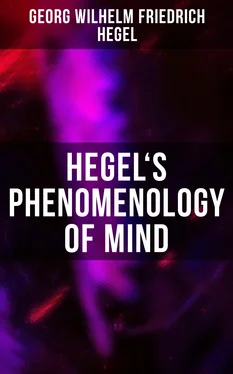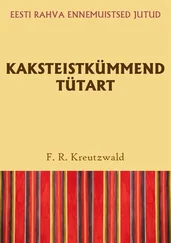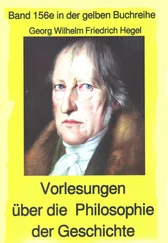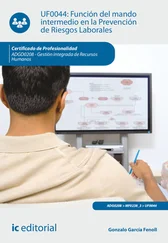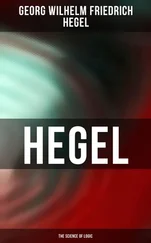Georg Wilhelm Friedrich Hegel - Hegel's Phenomenology of Mind
Здесь есть возможность читать онлайн «Georg Wilhelm Friedrich Hegel - Hegel's Phenomenology of Mind» — ознакомительный отрывок электронной книги совершенно бесплатно, а после прочтения отрывка купить полную версию. В некоторых случаях можно слушать аудио, скачать через торрент в формате fb2 и присутствует краткое содержание. Жанр: unrecognised, на английском языке. Описание произведения, (предисловие) а так же отзывы посетителей доступны на портале библиотеки ЛибКат.
- Название:Hegel's Phenomenology of Mind
- Автор:
- Жанр:
- Год:неизвестен
- ISBN:нет данных
- Рейтинг книги:4 / 5. Голосов: 1
-
Избранное:Добавить в избранное
- Отзывы:
-
Ваша оценка:
- 80
- 1
- 2
- 3
- 4
- 5
Hegel's Phenomenology of Mind: краткое содержание, описание и аннотация
Предлагаем к чтению аннотацию, описание, краткое содержание или предисловие (зависит от того, что написал сам автор книги «Hegel's Phenomenology of Mind»). Если вы не нашли необходимую информацию о книге — напишите в комментариях, мы постараемся отыскать её.
Hegel's Phenomenology of Mind — читать онлайн ознакомительный отрывок
Ниже представлен текст книги, разбитый по страницам. Система сохранения места последней прочитанной страницы, позволяет с удобством читать онлайн бесплатно книгу «Hegel's Phenomenology of Mind», без необходимости каждый раз заново искать на чём Вы остановились. Поставьте закладку, и сможете в любой момент перейти на страницу, на которой закончили чтение.
Интервал:
Закладка:
The real defect of this kind of knowledge, however, affects its process of knowing as much as its material. As to that process, in the first place we do not see any necessity in the construction. The necessity does not arise from the nature of the theorem: it is imposed; and the injunction to draw just these lines, an infinite number of others being equally possible, is blindly acquiesced in, without our knowing anything further, except that, as we fondly believe, this will serve our purpose in producing the proof. Later on this design then comes out too, and is therefore merely external in character, just because it is only after the proof is found that it comes to be known. In the same way, again, the proof takes a direction that begins anywhere we like, without our knowing as yet what relation this beginning has to the result to be brought out. In its course, it takes up certain specific elements and relations and lets others alone, without its being directly obvious what necessity there is in the matter. An external purpose controls this process.
The evidence peculiar to this defective way of knowing — an evidence on the strength of which mathematics plumes itself and proudly struts before philosophy — rests solely on the poverty of its purpose and the defectiveness of its material, and is on that account of a kind that philosophy must scorn to have anything to do with. Its purpose or principle is quantity. This is precisely the relationship that is non-essential, alien to the character of the notion. The process of knowledge goes on, therefore, on the surface, does not affect the concrete fact itself, does not touch its inner nature or lotion, and is hence not a conceptual way of comprehending. The material which provides mathematics with these welcome treasures of truth consists of space and numerical units ( das Eins ). Space is that kind of existence wherein the concrete notion inscribes the diversity it contains, as in an empty, lifeless element in which its differences likewise subsist in passive, lifeless form. What is concretely actual is not something spatial, such as is treated of in mathematics. With unrealities like the things mathematics takes account of, neither concrete sensuous perception nor philosophy has anything to do. In an unreal element of that sort we find, then, only unreal truth, fixed lifeless propositions. We can call a halt at any of them; the next begins of itself de novo , without the first having led up to the one that follows, and without any necessary connexion having in this way arisen from the nature of the subject-matter itself. So, too — and herein consists the formal character of mathematical evidence because of that principle and the element where it applies, knowledge advances along the lines of bare equality, of abstract identity. For what is lifeless, not being self-moved, does not bring about distinction within its essential nature; does not attain to essential opposition or unlikeness; and hence involves no transition of one opposite element into its other, no qualitative, immanent movement, no self-movement, It is quantity, a form of difference that does not touch the essential nature, which alone mathematics deals with. It abstracts from the fact that it is the notion which separates space into its dimensions, and determines the connexions between them and in them. It does not consider, for example, the relation of line to surface, and when it compares the diameter of a circle with its circumference, it runs up against their incommensurability, i.e. a relation in terms of the notion, an infinite element, that escapes mathematical determination.
Immanent or so-called pure mathematics, again, does not oppose time qua time to space, as a second subject-matter for consideration. Applied mathematics, no doubt, treats of time, as also of motion, and other concrete things as well; but it picks up from experience synthetic propositions — i.e. statements of their relations, which are determined by their conceptual nature — and merely applies its formulae to those propositions assumed to start with. That the so-called proofs of propositions like that concerning the equilibrium of the lever, the relation of space and time in gravitation, etc., which applied mathematics frequently gives, should be taken and given as proofs, is itself merely a proof of how great the need is for knowledge to have a process of proof, seeing that, even where proof is not to be had, knowledge yet puts a value on the mere semblance of it, and gets thereby a certain sense of satisfaction. A criticism of those proofs would be as instructive as it would be significant, if the criticism could strip mathematics of this artificial finery, and bring out its limitations, and thence show the necessity for another type of knowledge.
As to time, which, it is to be presumed, would, by way of the counterpart to space, constitute the object-matter of the other division of pure mathematics, this is the notion itself in the form of existence. The principle of quantity, of difference which is not determined by the notion, and the principle of equality, of abstract, lifeless unity, are incapable of dealing with that sheer restlessness of life and its absolute and inherent process of differentiation. It is therefore only in an arrested, paralysed form, only in the form of the quantitative unit, that this essentially negative activity becomes the second object-matter of this way of knowing, which, itself an external operation, degrades what is self-moving to the level of mere matter, in order thus to get an indifferent, external, lifeless content.
Philosophy, on the contrary, does not deal with a determination that is non-essential, but with a determination so far as it is an essential factor. The abstract or unreal is not its element and content, but the real, what is self-establishing, has life within itself, existence in its very notion. It is the process that creates its own moments in its course, and goes through them all; and the whole of this movement constitutes its positive content and its truth. This movement includes, therefore, within it the negative factor as well, the element which would be named falsity if it could be considered one from which we had to abstract. The element that disappears has rather to be looked at as itself essential, not in the sense of being something fixed, that has to be cut off from truth and allowed to lie outside it, heaven knows where; just as similarly the truth is not to be held to stand on the other side as an immovable lifeless positive element. Appearance is the process of arising into being and passing away again, a process that itself does not arise and does not pass away, but is per se, and constitutes reality and the life-movement of truth. The truth is thus the bacchanalian revel, where not a member is sober; and because every member no sooner becomes detached than it eo ipso collapses straightway, the revel is just as much a state of transparent unbroken calm. Judged by that movement, the particular shapes which mind assumes do not indeed subsist any more than do determinate thoughts or ideas; but they are, all the same, as much positive and necessary moments, as negative and transitory. In the entirety of the movement, taken as an unbroken quiescent whole, that which obtains distinctness in the course of its process and secures specific existence, is preserved in the form of a self-recollection, in which existence is self-knowledge, and self-knowledge, again, is immediate existence.
It might well seem necessary to state at the outset the chief points in connexion with the method of this process, the way in which science operates. Its nature, however, is to be found in what has already been said, while the proper systematic exposition of it is the special business of Logic, or rather is Logic itself. For the method is nothing else than the structure of the whole in its pure and essential form. In regard, however, to what has been hitherto currently held on this point, we must be sensible that the system of ideas bearing on the question of philosophical method, belongs also to a stage of mental culture that has now passed away. This may perhaps seem somewhat boastful or revolutionary; and I am far from adopting an attitude of that sort; but it is significant that the scientific régime bequeathed by mathematics — a régime of explanations, divisions, axioms, an array of theorems, with proofs, principles, and the consequences and conclusions drawn from them — all this has already come to be generally considered as at any rate out of date. Even though there is no clear idea why it is unsuitable, yet little or no use is made of it any longer; and even though it is not condemned outright, it is all the same not in favour. And we must be so far prejudiced in favour of what is excellent to believe that it can turn itself to practical account, and make itself acceptable. But it is not difficult to see that the method of propounding a proposition, producing reasons for it and then refuting its opposite by reasons too, is not the form in which truth can appear. Truth moves itself by its very nature; but the method just mentioned is a form of knowledge external to its material. Hence it is peculiar to mathematics and must be left to mathematics, which, as already indicated, takes for its principle the relation of quantity, a relation alien to the notion, and gets its material from lifeless space, and the equally lifeless numerical unit. Or, again, such a method, adopting a freer style, one involving more of arbitrariness and chance, may have a place in ordinary life, in a conversation, or in supplying matter-of-fact instruction for the satisfaction of curiosity rather than knowledge, very much as a preface does. In every-day life the mind finds its content in different kinds of knowledge, experiences of various sorts, concrete facts of sense, thoughts, too, and principles, and, in general, in whatever lies ready to hand, or passes for a solid stable entity, or real being. The mind follows wherever this leads, sometimes interrupting the connexion by an unrestrained caprice in dealing with the content, and takes up the attitude of determining and handling it in quite an external fashion. It runs the content back to some touchstone of certainty or other, even though it be but the feeling of the moment; and conviction is satisfied if it reaches some familiar resting-place.
Читать дальшеИнтервал:
Закладка:
Похожие книги на «Hegel's Phenomenology of Mind»
Представляем Вашему вниманию похожие книги на «Hegel's Phenomenology of Mind» списком для выбора. Мы отобрали схожую по названию и смыслу литературу в надежде предоставить читателям больше вариантов отыскать новые, интересные, ещё непрочитанные произведения.
Обсуждение, отзывы о книге «Hegel's Phenomenology of Mind» и просто собственные мнения читателей. Оставьте ваши комментарии, напишите, что Вы думаете о произведении, его смысле или главных героях. Укажите что конкретно понравилось, а что нет, и почему Вы так считаете.
